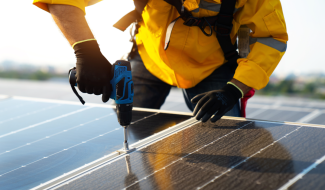Solar Energy and the Inflation Reduction Act of 2022
The Inflation Reduction Act represents a momentous extension of solar tax credits for renewable energy system owners. It also introduces several new investments for clean energy manufacturing and industry advancement.
Investment Tax Credit (ITC) Extension
Originally enacted in 2006, the investment tax credit has helped the United States solar industry grow by more than 10,000% in 15 years. The Inflation Reduction Act of 2022 will extend the ITC for 10 years while reinstating a 30% tax rebate on the total cost of a solar installation.
The solar ITC can be redeemed by the owner of a clean energy system on a residential or commercial property. At up to 30% of project expenses, the federal tax incentive can be applied to the total costs of parts, labor, and installation for solar energy panels, battery storage, and other system components.
After the 10-year extension, the solar investment tax credit will be reduced to 26% of total system costs in 2033, then 22% in 2034. The current 30% tax credit will also be retroactively available for eligible solar energy system owners with installations completed in 2021 at a 26% rate.
New Standalone Storage ITC
Although the federal ITC has always been available for solar power and battery backup systems, the Inflation Reduction Act introduces a new tax credit for standalone electricity storage. At up to 30% of an Energy Storage System’s (ESS) total cost until the end of 2033, homeowners can qualify for tax credits on residential, standalone batteries with a capacity of 3 kWh and more beginning on January 1, 2023.
On a shorter timeline, the new commercial storage ITC will also be available to businesses that install standalone batteries over 5 kWh between 2023 and 2025. The continuation of commercial storage credits beyond 2025 is contingent on the Department of Treasury’s future evaluation of carbon reduction goals.
Clean Energy Jobs and Industry Growth
In addition to the extended tax credits for solar and storage ownership, the Inflation Reduction Act will invest more than $60 billion in domestic clean energy manufacturing. This includes a $10 billion investment in clean energy system production, for technologies such as solar panels, wind turbines, and electric vehicles, as well as a $2 billion investment to accelerate renewable power research.


